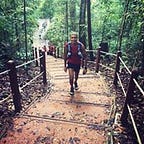5 Success Lessons I Learned From Running Ultramarathons | Story of Fitness
Tejo Thomas has participated in 14 ultramarathons in countries such as Japan, Hong Kong, Malaysia, the Philippines, Vietnam, Singapore, and several other European cities. He completed 11 of them and did not finish three races.
His first overseas ultra was 100 km on Malaysian Borneo trails with a height of 5000 meters, and he was unable to complete it due to lack of elevation preparation and preparing. He went back two years later to complete the same race. His second DNF was 100miler in Japan around Mt. Fuji, and he had to stop at 50 km due to an injury.
Here are the lessons he learned from running ultramarathons.
1) Consistency: The Most Important Element of Training
Leading up to the ultra-marathon, I would plan a strategy to spend time on my legs more time and be mindful to avoid over-training. There is a cycle of peaking and tapering with long slow runs, speed work, and strength training and night runs to adapt to a specific race. Even on days when I hated the idea of wearing my sneakers, I would push myself to go out and run…While training for ultras, I focus a lot on volume and intensity.
I do not prefer the gym much for training and use most of the training sessions outdoors in the fresh air and often try to do bodyweight training in the park after my morning runs. I also make sure that my body stays injury-free, for which I do stretching, plenty of sleep and yoga, and sometimes a foam rolling if the muscles feel tight.
Even when I am not training for any race, I love to train. Often the goal is to enjoy the runs and training and whenever a race comes, I feel ready. Running and training have taught me much about my body and mental adaptations to stretch goals to achieve more. To realize that one can do more that one can think is a joyful experience.
2) When things get tough, take a break
I recall during a race trip to Hong Kong, I loved those new shoes and wore them for the race. Usually, new shoes during a long run are not recommended. At 50 km, my one outer toes were swollen with blisters and I had decided to sit down at check-point, contemplating to stop.
A fellow runner from Hong Kong asked me if I’m ok and I removed my socks and shared the scenario. He was planning to quit because of tiredness. I told him, you have no injury and can continue.
We talked a bit and I took the plaster and pin and broke the blister and applied the cream and taped the leg and started to walk together. Suddenly, I saw a few white cranes in the sky and was happy and slowly started to run and eventually finished the race of 100 km.
3) Nutrition before, during and after the race
Before a race, I make sure to get sufficient sleep and eat normal food and ensure plenty of water in the body. Many races have check-point with fruits like oranges, biscuits, coke, and water. It is important to carry your nutrition and not completely depend on the aid stations.
During the race, I carry salt tablets to replenish the salt, nutrition like tailwind or pure and chocolates. At aid stations, just fill up the water and grab some cut oranges and keep going. It is important to plan so one does not spend much time at aid stations.
4) When being alive feels great
Running is also an experience in gratitude to self, nature, and the beauty of nature. Nature often has a soothing connection to your heart when one is extremely tired and must go on. Often during the race, you are exposed to elements such as rain, cold weather, winds, and hot and humid weather.
I recall during an ultra-run in Borneo, Malaysia, felt very sleepy at night and dozed for a minute and my friend tapped me awake and suddenly the starry sky at night among the mountains was a sight to behold, and being alive felt great.
5) Failure is a detour, not a dead end street
The interesting lesson I learned running an ultra is that no matter how trained you are, you can never confidently say, that you can finish a race. It is always a journey of mind over body and constant positive reminders and digging deep.
There were a couple of races that I couldn’t complete and they taught me many lessons on approaching mountains with respect and apply those failures in training better and most importantly accepting failure as part of the being myself and considering the journey as important and not the outcome.
Also read:
Originally published at http://storyoffitness.info on October 27, 2020.
